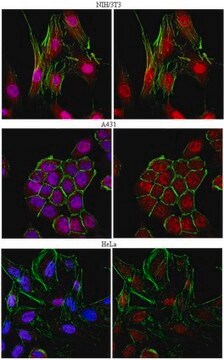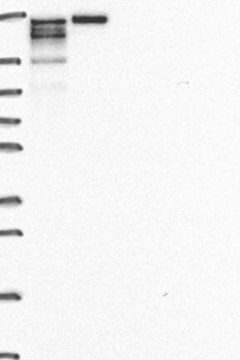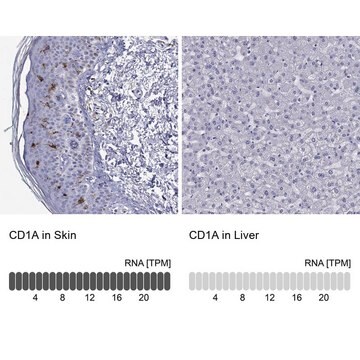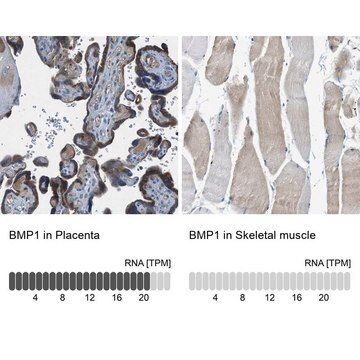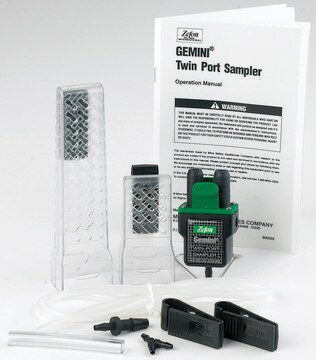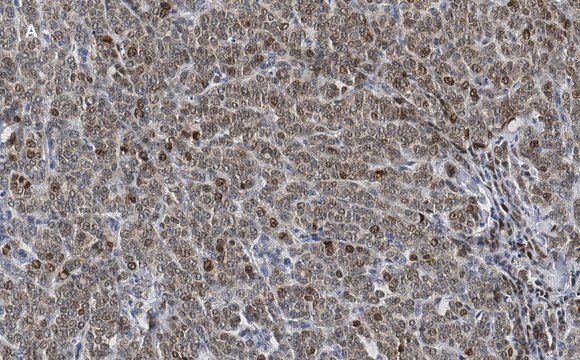HPA019154
Anti-SMAD4 antibody produced in rabbit
Prestige Antibodies® Powered by Atlas Antibodies, affinity isolated antibody, buffered aqueous glycerol solution
别名:
Anti-Deletion target in pancreatic carcinoma 4, Anti-Mothers against DPP homolog 4, Anti-Mothers against decapentaplegic homolog 4, Anti-SMAD 4, Anti-hSMAD4
登录查看公司和协议定价
所有图片(9)
About This Item
推荐产品
生物源
rabbit
品質等級
共軛
unconjugated
抗體表格
affinity isolated antibody
抗體產品種類
primary antibodies
無性繁殖
polyclonal
產品線
Prestige Antibodies® Powered by Atlas Antibodies
形狀
buffered aqueous glycerol solution
物種活性
mouse, human
技術
immunoblotting: 0.04-0.4 μg/mL
immunofluorescence: 0.25-2 μg/mL
immunohistochemistry: 1:50-1:200
免疫原序列
AFDLKCDSVCVNPYHYERVVSPGIDLSGLTLQSNAPSSMMVKDEYVHDFEGQPSLSTEGHSIQTIQHPPSNRASTETYSTPALLAPSESNATSTANFPNIPVASTSQPASILGGSHSEGLLQI
UniProt登錄號
運輸包裝
wet ice
儲存溫度
−20°C
目標翻譯後修改
unmodified
基因資訊
human ... SMAD4(4089)
一般說明
The gene SMAD4 (mothers against decapentaplegic homolog 4) is mapped to human chromosome 18q21.1. The protein localizes in the cytoplasm and nucleus. SMAD4 is also referred as DPC4 (deleted in pancreatic carcinoma).
免疫原
Mothers against decapentaplegic homolog 4 recombinant protein epitope signature tag (PrEST)
應用
All Prestige Antibodies Powered by Atlas Antibodies are developed and validated by the Human Protein Atlas (HPA) project and as a result, are supported by the most extensive characterization in the industry.
The Human Protein Atlas project can be subdivided into three efforts: Human Tissue Atlas, Cancer Atlas, and Human Cell Atlas. The antibodies that have been generated in support of the Tissue and Cancer Atlas projects have been tested by immunohistochemistry against hundreds of normal and disease tissues and through the recent efforts of the Human Cell Atlas project, many have been characterized by immunofluorescence to map the human proteome not only at the tissue level but now at the subcellular level. These images and the collection of this vast data set can be viewed on the Human Protein Atlas (HPA) site by clicking on the Image Gallery link. We also provide Prestige Antibodies® protocols and other useful information.
The Human Protein Atlas project can be subdivided into three efforts: Human Tissue Atlas, Cancer Atlas, and Human Cell Atlas. The antibodies that have been generated in support of the Tissue and Cancer Atlas projects have been tested by immunohistochemistry against hundreds of normal and disease tissues and through the recent efforts of the Human Cell Atlas project, many have been characterized by immunofluorescence to map the human proteome not only at the tissue level but now at the subcellular level. These images and the collection of this vast data set can be viewed on the Human Protein Atlas (HPA) site by clicking on the Image Gallery link. We also provide Prestige Antibodies® protocols and other useful information.
Anti-SMAD4 antibody produced in rabbit, a Prestige Antibody, is developed and validated by the Human Protein Atlas (HPA) project . Each antibody is tested by immunohistochemistry against hundreds of normal and disease tissues. These images can be viewed on the Human Protein Atlas (HPA) site by clicking on the Image Gallery link. The antibodies are also tested using immunofluorescence and western blotting. To view these protocols and other useful information about Prestige Antibodies and the HPA, visit sigma.com/prestige.
生化/生理作用
Upon TGFβ (transforming growth factor β) activation, SMAD (mothers against decapentaplegic homolog) proteins are responsible for transcription activation in the nucleus. SMAD4 is a crucial protein of TGFβ signaling. It promotes association of SMAD2/4 to DNA and helps SMAD1/2 in transcription stimulation. Mutations in SMAD4 are linked with juvenile polyposis syndrome, hereditary haemorrhagic telangiectasia and Myhre syndrome. In renal cell carcinoma, it activates forkhead box protein H1 and thereby inhibits the progression of the carcinoma. SMAD4 is considered as a tumor suppressor protein.
特點和優勢
Prestige Antibodies® are highly characterized and extensively validated antibodies with the added benefit of all available characterization data for each target being accessible via the Human Protein Atlas portal linked just below the product name at the top of this page. The uniqueness and low cross-reactivity of the Prestige Antibodies® to other proteins are due to a thorough selection of antigen regions, affinity purification, and stringent selection. Prestige antigen controls are available for every corresponding Prestige Antibody and can be found in the linkage section.
Every Prestige Antibody is tested in the following ways:
Every Prestige Antibody is tested in the following ways:
- IHC tissue array of 44 normal human tissues and 20 of the most common cancer type tissues.
- Protein array of 364 human recombinant protein fragments.
聯結
Corresponding Antigen APREST86689
外觀
Solution in phosphate-buffered saline, pH 7.2, containing 40% glycerol and 0.02% sodium azide
法律資訊
Prestige Antibodies is a registered trademark of Merck KGaA, Darmstadt, Germany
免責聲明
Unless otherwise stated in our catalog or other company documentation accompanying the product(s), our products are intended for research use only and are not to be used for any other purpose, which includes but is not limited to, unauthorized commercial uses, in vitro diagnostic uses, ex vivo or in vivo therapeutic uses or any type of consumption or application to humans or animals.
未找到合适的产品?
试试我们的产品选型工具.
儲存類別代碼
10 - Combustible liquids
水污染物質分類(WGK)
WGK 1
Yunli Liu et al.
Molecular medicine reports, 11(4), 2717-2722 (2014-12-09)
Smad4 has recently been identified as a tumor suppressor gene in a variety of cancers, yet the role of Smad4 in renal cell carcinoma (RCC) remained to be elusive. Therefore, the aim of the present study was to explore the
Lina Jia et al.
Molecular cancer research : MCR, 12(12), 1779-1795 (2014-07-26)
SMAD4 has been suggested to inhibit the activity of the WNT/β-catenin signaling pathway in cancer. However, the mechanism by which SMAD4 antagonizes WNT/β-catenin signaling in cancer remains largely unknown. Aurora A kinase (AURKA), which is frequently overexpressed in cancer, increases
Carol J Gallione et al.
Lancet (London, England), 363(9412), 852-859 (2004-03-20)
Juvenile polyposis and hereditary haemorrhagic telangiectasia are autosomal dominant disorders with distinct and non-overlapping clinical features. The former, an inherited gastrointestinal malignancy predisposition, is caused by mutations in MADH4 (encoding SMAD4) or BMPR1A, and the latter is a vascular malformation
Viviana Caputo et al.
American journal of human genetics, 90(1), 161-169 (2012-01-17)
Myhre syndrome is a developmental disorder characterized by reduced growth, generalized muscular hypertrophy, facial dysmorphism, deafness, cognitive deficits, joint stiffness, and skeletal anomalies. Here, by performing exome sequencing of a single affected individual and coupling the results to a hypothesis-driven
F Liu et al.
Genes & development, 11(23), 3157-3167 (1998-02-12)
Upon ligand binding, the receptors of the TGFbeta family phosphorylate Smad proteins, which then move into the nucleus where they activate transcription. To carry out this function, the receptor-activated Smads 1 and 2 require association with the product of deleted
我们的科学家团队拥有各种研究领域经验,包括生命科学、材料科学、化学合成、色谱、分析及许多其他领域.
联系技术服务部门